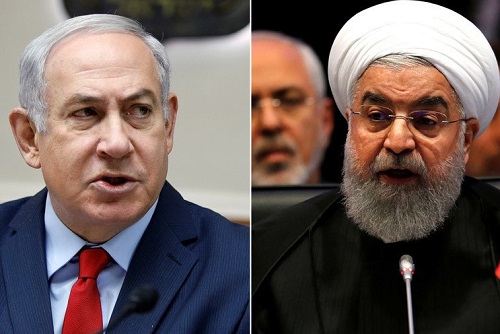Reuters photo
By
Tom Arms
Donald Trump has dropped a massive boulder in the world’s diplomatic pond. Its ripples will be felt in every corner of the globe and in some cases the ripples could quickly grow to tsunami proportions.
Let’s start with the epicentre– the Middle East. The region is already peppered with smouldering short fuses: The Arab-Israeli conflict; Syrian civil war; Yemeni civil war; Turks v. Kurds; Qataris v Saudis and Emirates; Saudis v. Iran; The Russian presence; threatened American withdrawal; Hezbollah…
The Iran Nuclear Accord (aka Joint Consultative Plan of Action) was one of the region’s few diplomatic success stories—albeit a limited one.
Since President Trump announced American withdrawal from the Accord, Iran’s Supreme Leader Ayatollah Khomeini has announced that his country will resume work on building a nuclear weapon.
In return, Israel has bombed an Iranian base outside Damascus; announced the preparation of bomb shelters; called up reservists for air defence, intelligence and home front command units and deployed missile defence batteries in Northern Israel.
Iran’s Army Chief of Staff, Major General Mohammad Bagheri, warned: “If the enemy casts a covetous eye on our interests or conducts even a slight act of aggression, the Islamic Republic will give an appropriate response at an appropriate time.”
Back in Washington they are celebrating. Not the problems in the Middle East, but the release of three American citizens from North Korean prison. President Trump hailed the release as a diplomatic triumph for his administration and the best of auguries for his forthcoming summit with Pyongyang’s Kim Jong-un.
Others are most sceptical of summit success. They fail to see any advantage for Kim in unilateral de-nuclearisation, and Trump has said he will accept nothing less. It will take a raft of promises covering trade, aid and politics to persuade Kim to give up his nuclear toys. But why he should accept such promises? His good friends the Iranians, will tell him, as Ayatollah Khomeini, said: “You cannot trust the Americans.”
One person who will celebrate American withdrawal from the Iran Nuclear accord is the recently re-inaugurated Vladimir Putin. Just as the Trump Administration appears to be awakening to the military and political threat of Putin’s Russia, it has created an opportunity for the Russian leader to come in from the diplomatic freezer into which he was cast in the wake of Russian involvement in Ukraine and Syria.
Russia is the only signatory to the Iran Nuclear Accord with good relations with both Iran and Israel. It is in a de facto military alliance with Tehran in Syria and the two countries have been working with Turkey to negotiate a settlement to the civil war which leaves President Assad in power. Israel and Moscow have historic good relations. In fact, Israeli Premier Binyamin Netanyahu was in Moscow on the day that President Trump announced US withdrawal from the Iran Nuclear Accord.
Putin is the logical, albeit unpalatable, choice for honest broker to negotiate a way out of the diplomatic toilet into which Donald Trump has dumped the world. If he succeeds his political capital, and the capital of the authoritarian system of government that he represents, will increase exponentially.
Western Europe, on the other hand, has suffered a major diplomatic failure. Britain, France and Germany – key American allies for 70 years–practically dropped to their knees and pleaded with President Trump to stay in the Agreement. He spurned them. He even publicly mocked Britain and France days before the withdrawal announcement.
This, plus threatened American tariffs has put the heaviest strain on the Transatlantic Alliance in modern history. The Observer newspaper wrote two days before the withdrawal announcement: “If he (Trump) rips up the Iran nuclear deal, American’s relationship with Europe will also be irreparably damaged.”
Relations across the pond will top the agenda when the EU heads of government meet in the Bulgarian capital of Sofia next week. There is a growing feeling in Europe that the United States can no longer be counted on as a reliable ally. Europe, it is argued, must develop politically and militarily to replace the support it has lost from the other side of the Atlantic.
Tom Arms
I am a journalist, entrepreneur and historian with extensive experience in print, web and broadcast journalism. I started as a diplomatic correspondent, wrote several books (The Falklands Crisis, World Elections On File and the Encyclopedia of the Cold War), and then in 1987 started my own business (Future Events News Service, www.fensinformation.com) which over 25 years established itself as the world and UK media’s diary. Our strapline was: “We set the world’s news agenda.” I sold FENS in December 2012 but retained the exclusive broadcast rights to all of FENS data. To exploit these rights I set up LookAhead TV which produces unique programmes which “Broadcasts Tomorrow Today” so that viewers can “Plan to Participate.” LookAhead has appeared regularly on Vox Africa, Radio Tatras International, The Conversation and Voice of Africa Radio.
In addition to being a syndicated broadcaster and columnist on global affairs, Tom is also available for speaking engagements and can be contacted on Twitter, Linkedin and email: [email protected].



No Comments Yet!
You can be first to comment this post!